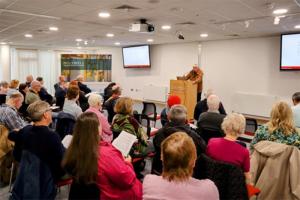
Author Paul Gosling has laid out the challenges facing the health services both north and south of the border in the first of a series of mythbusting events organised by Holywell Trust addressing constitutional questions.
Holy well Trust is supported by the Community Relations Council though its Core Funding Scheme.
Gosling painted a stark picture of the health services in the two jurisdictions, saying both are in crisis and in both cases the crises “are so serious that nothing short of radical surgery will fix them.”
He laid out the sobering statistics for Northern Ireland, where he said pre-Covid waiting lists were 3,000 times longer than in England (weighted for population). Northern Ireland also spent £171 more per patient.
He stated these figures demonstrate why it would be wrong to conclude that the NHS is either an effective or better system than that of the Republic of Ireland's at present. He argued that Northern Ireland now has a similar mix of private and public healthcare as people are increasingly paying privately to avoid long waits to be seen and lack of access to treatment.
The mental health crisis was also highlighted as a major issue for Northern Ireland, with a trauma-informed response needed to deal with a population still impacted by the conflict.
Some of the costs for healthcare in the Republic of Ireland were laid out, with a visit to the GP costing from €45 and a potential €100 charge for going to A&E. However, half of the population now have free access to a GP and some other healthcare charges have been dropped.
Waiting lists were identified as a problem in the Republic of Ireland, with over 700,000 patients waiting for either in-patient or outpatient treatment as of June 2023, with more than 150,000 having waited over a year. However, the Republic's over one-year waiting list, per capita, is shorter than all UK nations bar England.
There has been recognition in the South that the public health service should be more comprehensive, and the Irish state's SláinteCare plan would see the service moving closer to the UK's NHS over a multi-year period: however, its implementation is significantly delayed.
Without this being achieved, the personal cost of paying for healthcare is likely to be a major barrier to a 'yes' vote in a border poll, his research points out.
Even with the constitutional question removed from the equation, cross-border cooperation presents opportunities to improve health provision and reduce overheads, with examples that have already been implemented including the all-island children’s heart surgery unit in Dublin and the cross-border cancer care facility at Altnagelvin Hospital.
Paul Gosling said: “The newly appointed health minister Mike Nesbitt has indicated his commitment to doing things differently and has appointed Dr Rafael Bengoa to return to review progress on his 2016 report on health services transformation. Mike Nesbitt’s ‘Live Better’ pilot scheme to address health inequalities in some of our poorest communities is very interesting.
“Hopefully it will lead to service improvements that address health inequalities. We will need to watch its progress carefully. But the risk is that so much needs to be done that there will be insufficient focus on any one element of the health reform programme. While increased cross-border co-operation could be a pragmatic approach to address many of the challenges facing health provision here, it also creates political and identity concerns that are a potential barrier to service improvement.”
The next event in the Future Relationship Conversations series at Holywell Trust will be on the Windsor Framework which will be analysed by David Phinnemore and Lisa Claire Whitten from Queen’s University Belfast at 7 PM on Tuesday 27 August 2024.
Other topics in the programme will include the North West Economic Region, Reporting the Divide and contextualising the Constitutional Question.
The events are part of the Future Relationship Conversations project facilitated by Holywell Trust, which aims to engage with the community to present a clear and unbiased outlook on questions around the constitutional status of Northern Ireland, with the aim to remove uncertainty and move the conversation beyond the normal identity-focused assumptions.